The washed-up actor with the fading good looks hangs on to the agent's every word as if his life depended on it. Rick Dalton just needs the right role to come along, and what better place for get his foot back in the door than at this iconic restaurant in the heart of Hollywood? But this power meeting at Musso and Frank Grill isn't going the way he hoped. What was ostensibly a prelude to a job offer takes an unexpected detour into Deconstructionville, and what's being dissected is Dalton's nosediving showbiz career.
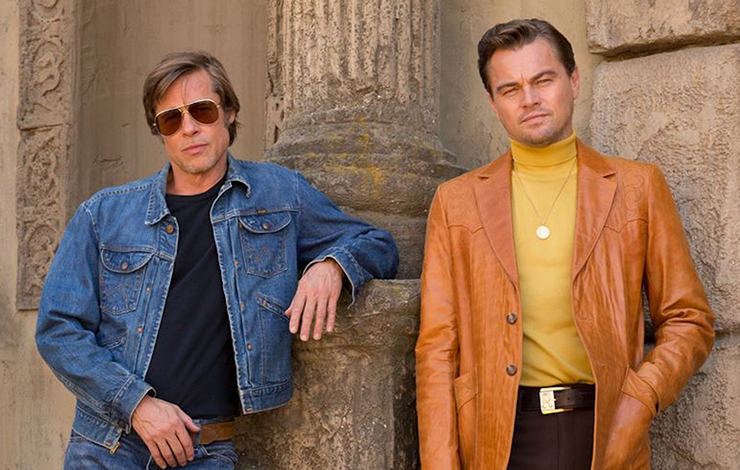 Courtesy Sony Pictures" />
Courtesy Sony Pictures" /> Brad Pitt, Leonardo DiCaprio in "Once Upon a Time . . .in Hollywood"
Courtesy Sony Pictures
Anyone who's seen “Mommie Dearest” will know immediately what's taking place in this early scene, set in February 1969, of “Once Upon a Time ... in Hollywood,” Quentin Tarantino's ninth and, by his estimation, next to last feature. It's the splash of cold water that tells a screen actor he's Cinderella, and the clock's about to strike 12.
Dalton (Leonardo DiCaprio) can't even be called box office poison, as he was never able to make the jump to the big screen. The star of the fictional television series “Bounty Law” is more of a ratings nuisance, perceived as a negligible talent who's allowed himself to be typecast as the heavy in guest TV spots.
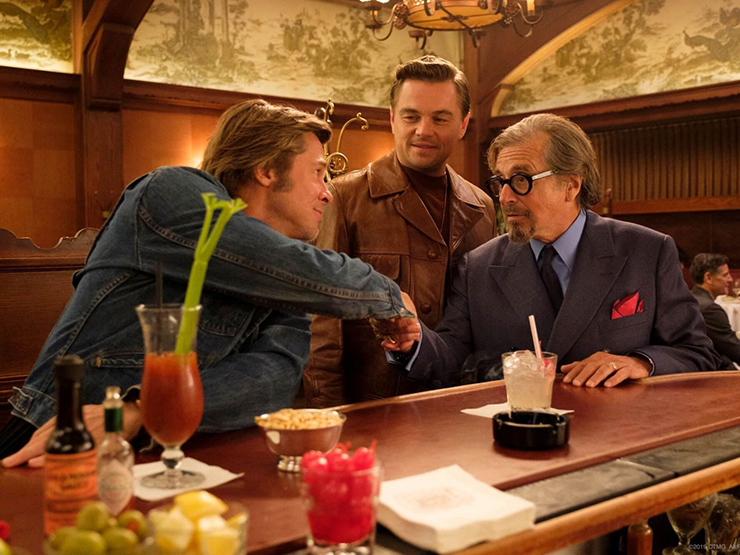
Brad Pitt, Leonardo DiCaprio, Al Pacino
Courtesy Sony Pictures
Thing is, Dalton, no longer the strapping young man who doled out justice at the end of his six-shot for domestic consumption, is pretty fed up playing the cold-hearted baddie. But that shot at a comeback is gonna have to wait for another day, at least according to agent Marvin Schwarzs' (Al Pacino, understated despite the thick accent). So does Dalton pull a Joan Crawford and takes the garden shears to his front yard? Nope. Seconds after walking out of Musso and Frank, he crumbles into the arms of Cliff Booth (Brad Pitt, aging like fine wine), his buddy, chauffeur and longtime stunt double.
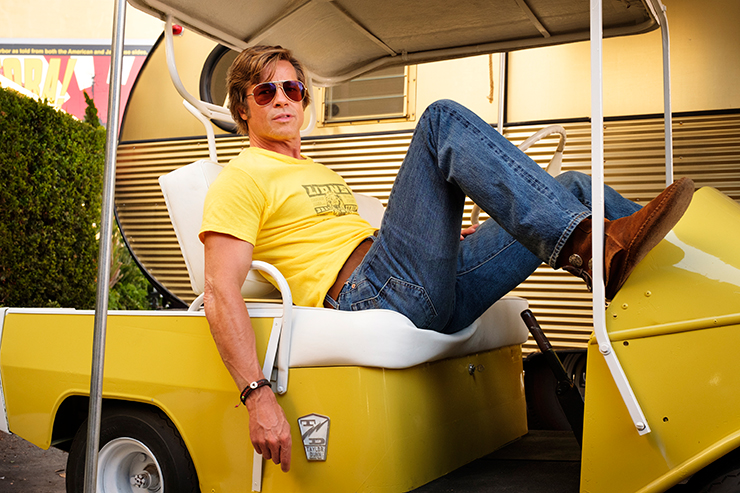
Brad Pitt
Courtesy Sony Pictures
Dalton's fragile ego, coupled with an ongoing struggle with his demons, kicks off this sprawling tapestry about nothing less than the twilight of an era in Hollywood history, that moment where the dream factory stood at a crossroads. On one side, a disintegrating studio system in collective denial about its future prospects. On the other, paradigm-shifting mavericks ready to make their mark and transform the way movies and television shows are made.
All those declarations you may have read about “Once Upon a Time” being Tarantino's most personal project are right on target. It is also his most meandering and self-indulgent effort, its kaleidoscopic scope and freewheeling vibe stretched out to the point that it tested this longtime QT fan's goodwill. You will either connect with this tapestry's laid-back, California dreamin' vibe or you won't. Me? I dug it plenty, at least until an attempt at an ill-conceived bit of wish-fulfillment fantasy threatens to derail it.
For most of its leisurely paced 161 minutes, Tarantino delivers a generous supply of celluloid pleasures big and small, starting with production designer Barbara Ling's astonishing, knock-your-socks-off recreation of 1969 Hollywood. It all feels vibrant and tactile, but even more accomplished, the film takes pains to capture the city's geography to an obsessively detailed degree. Tarantino makes movies with repeat viewings in mind, and I can only imagine what will become more apparent about its immersive depiction of late-'60s Los Angeles.
Another inspired decision is to focus on Tinseltown's second- and third-tier talents, the burnouts and marginal figures typically relegated to the sidelines in movies about making movies. Tarantino shrewdly mixes his fictional central duo with A-listers like Steve McQueen (Damian Lewis), Roman Polanski (Rafal Zawierucha) and Bruce Lee (Mike Moh), while still keeping Dalton and Booth at the center of its narrative. DiCaprio is sensational, about as good here as his career-high turn in Martin Scorsese's “The Wolf of Wall Street.” Pitt has the less showy role, but he is every bit as captivating as a California boy whose easygoing demeanor, Tarantino suggests, conceals a dark past.
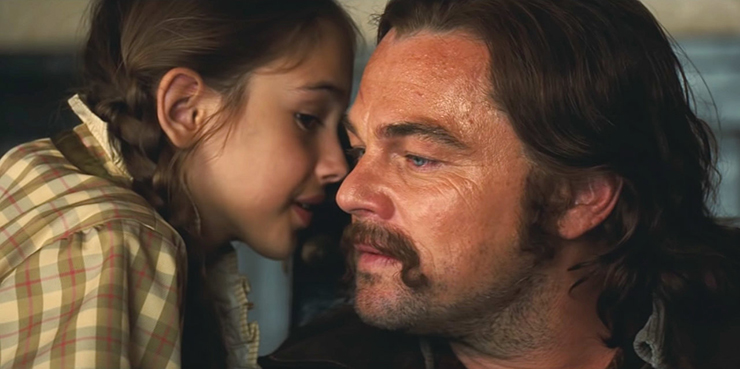
Julia Butters, Leonardo DiCaprio
Courtesy Sony Pictures
“Hollywood” is firing on all cylinders when following Dalton on the set of a new Western series, as he grapples with learning his lines, keeping the bottle at bay and engaging in some pointed behind-the-scenes banter with 8-year-old co-star Trudi Fraser (Julia Butters, a real find). The audience at my advance screening laughed when Dalton, buried under a wig and handlebar mustache playing yet another villain, breaks down in tears when he sees his professional decline reflected in the paperback novel he's reading in between takes, but it's pretty clear Tarantino and DiCaprio are not aiming for easy laughs. The poignancy of Dalton's inner torment sneaks up on you without compromising the film's frequently lighthearted spirit.
Too bad that Tarantino hadn't given similar nuance to some of his smaller characters. It's unlikely the film would be facing backlash from Bruce Lee's daughter if he had given Moh more to work with than playing the martial arts icon as a cocky show-off who gets his ass handed to him by Booth. The cartoonish moment recalls the filmmaker's earlier work in a way that seems at odds with the gentler approach he displays here.
One also wishes “Once Upon a Time” had a smidgen of the pep and snap of Tarantino's longtime collaboration with editor Sally Menke, who died in 2010. His current editor, Fred Raskin (“Guardians of the Galaxy,” “Fast Five”), has done a commendable job of shaping the narrative of the “Pulp Fiction” auteur's more recent efforts, but there's an alchemy that's been lost, as well as a tendency to indulge in longueurs that just make the films feel ... longer. “Hollywood,” alas, is no exception.
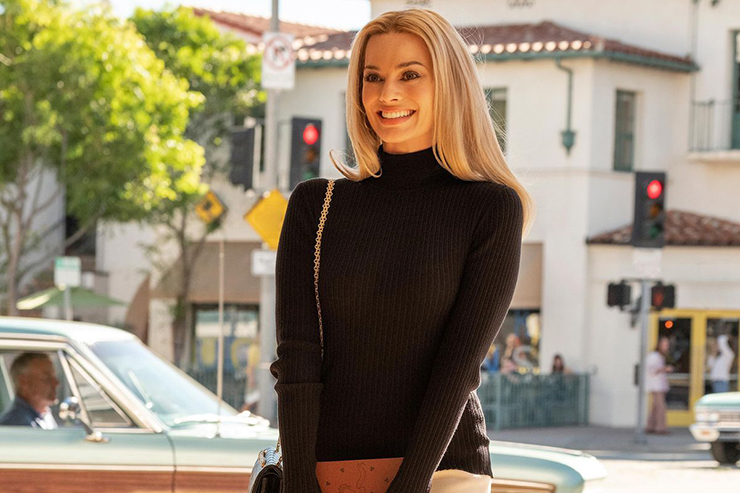
Margot Robbie as Sharon Tate
Courtesy Sony Pictures
Where I side with Tarantino is in the film's portrayal of Sharon Tate (Margot Robbie), who was married to Polanski but had her own successful movie career, perhaps most prominently in the camp classic “Valley of the Dolls.” When Tate asks the manager of a movie theater to let her in to catch her performance opposite Dean Martin at a matinee showing of the action comedy “The Wrecking Crew,” the camera lingers on Robbie as Tate as she absorbs the audience's enjoyment of her comic chops. It's a lovely moment. Robbie doesn't have much dialogue here, but her character is posited as the film's patron saint, personifying all that is pure, honorable and most fashionable in Hollywood's dream factory.
Such a tribute works while Tarantino periodically looks in on Tate as she enjoys her glamorous life. There she is, retrieving her luggage at the same LAX terminal where Jackie Brown made her irresistible onscreen introduction. There she is, dancing by herself at a Hollywood party, while McQueen reveals some of her romantic past. Even though Tate and Polanski live next door to Dalton on Cielo Drive, the protagonist's arc would not be affected if they were to be removed from the film. And yet, I never felt Tate's scenes to be superfluous. On the contrary, they further enriched this disarmingly overstuffed tapestry.
Tate's presence becomes more problematic, however, as “Hollywood” inches closer to the date of the Manson Family murders, when members of Charles Manson's cult broke into Tate's home while her husband was overseas and murdered her, her unborn baby and four others staying in the residence. I'll tread carefully here, but suffice it to say Tarantino's handling of what went down that night comes from a place of noble intentions. What happens in this retelling attempts to rewrite history the way he did in “Inglourious Basterds” and “Django Unchained.” This time around, though, the revisionism strikes a sour note. Blood is shed in that expertly staged way one has come to expect from Tarantino, but it has the unintended effect of undermining the magnitude of the real-life tragedy.
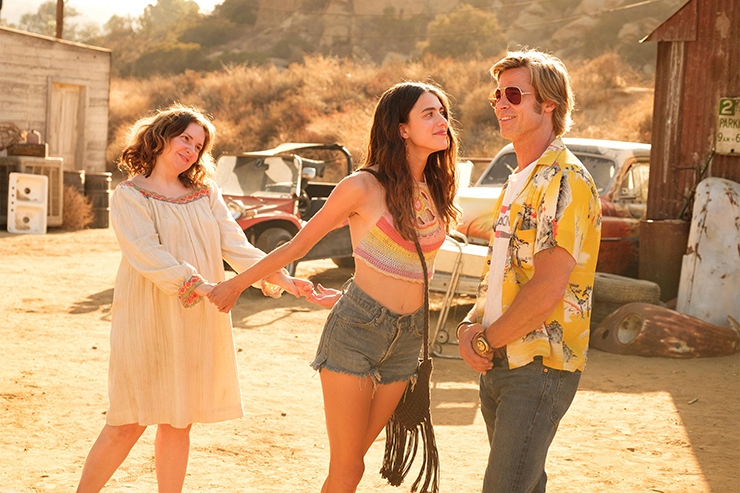
Lena Dunham, Margaret Qualley, Brad Pitt
Courtesy Sony Pictures
"Once Upon a Time ... in Hollywood" opened to robust business this past weekend, thanks in large part to its stars' mighty pull and Tarantino's own following. At $41 million, its box office haul is the filmmaker's biggest domestic debut. It's a rare triumph for a film whose heroes do not have superpowers and are not based on characters from lucrative franchises. And yet I was left feeling there was a tighter and stronger film than the one we got. It's an ambitious and affectionate valentine that bites off more than it can chew but still finds a way to reward viewers' patience. Is it my least favorite QT flick? Let me take another look.
"Once Upon a Time ... in Hollywood" is now showing across South Florida in wide release, including the Silverspot Cinema in downtown Miami, the Landmark at Merrick Park and the Classic Gateway Theatre in Fort Lauderdale. See it on the biggest screen you can find.
 MAIN MENU
MAIN MENU

